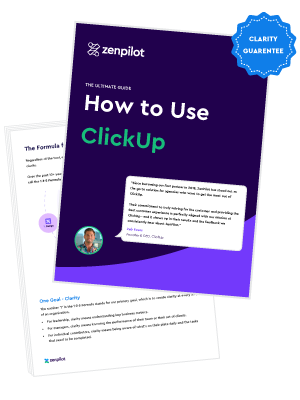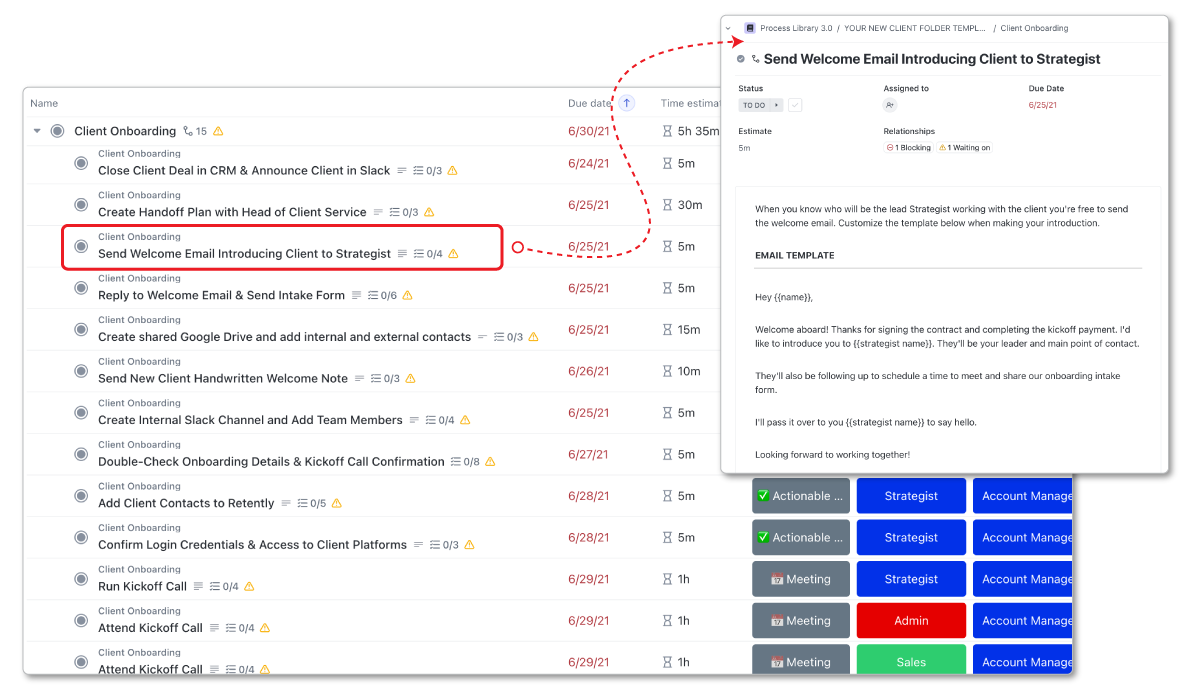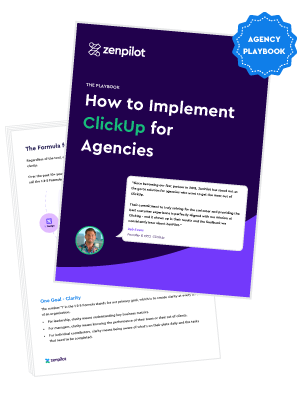1. If It's Not in Your Project Management System, It Didn't Happen
The cornerstone of efficient agency operations is a robust project management system. While there are many options available, such as Monday, Teamwork, or ClickUp, the specific tool you choose is less important than how you use it.
BONUS
Download the Complete "How to Use ClickUp" Guide FREE
Get the complete 56-page guide to learn how ClickUp's #1 solutions partner uses ClickUp.

The key is to adopt the mindset that if a task, communication, or piece of work isn't recorded in your project management system, it essentially didn't happen.
Why This Habit Matters
- Single Source of Truth: In today's fast-paced agency environment, especially with remote teams, having a centralized location for all project-related information is crucial. It ensures that everyone has access to the same, up-to-date information, reducing miscommunications and errors.
- Prevents Duplicate Work: When all tasks and progress are recorded in one place, it prevents team members from unknowingly duplicating each other's efforts. This saves time and resources, increasing overall efficiency.
- Builds Trust in Data: Consistently using your project management system for all work-related activities means you can trust the data within it. This trust is essential for making informed decisions about resource allocation, client management, and business strategy.
- Facilitates Better Project Tracking: With all information in one place, it becomes much easier to track the progress of projects, identify bottlenecks, and ensure nothing falls through the cracks. You'll make your project managers extremely happy with this habit! 😄
Implementing This Habit
To make this habit stick, consider the following strategies:
- Create Comprehensive Templates: Develop templates for all your common workflows and projects within your project management system. This makes it easier for team members to input information consistently and ensures no steps are missed.
- Train Your Team: Invest time in training your team on how to use the project management system effectively. Make sure they understand the importance of recording all work-related activities within the system.
- Lead by Example: As a leader, make sure you're consistently using the system for all your work. This sets the tone for the rest of the team.
- Regular Audits: Periodically review how the system is being used and address any gaps or inconsistencies you find.
By adopting this habit, you're creating a reliable, centralized hub of information that will serve as the backbone of your agency's operations as you scale.
2. Due Dates Matter
Your due dates must be due dates. 99.99% of agencies fall to the habit of poorly planning work and then remapping due dates over and over... and over again. STOP.
Treating due dates as suggestions can lead to a host of problems that hinder your agency's ability to scale effectively. The habit of respecting and adhering to due dates is crucial for maintaining smooth operations and client satisfaction. Yes, high-priority work will come up, and due dates may need to be adjusted in some cases, but the more realistic your due dates are, the healthier your agency will be.
Why This Habit Matters
- Builds Realistic Timelines: When your team consistently meets due dates, it becomes easier to create accurate timelines for future projects. This leads to better resource allocation and more satisfied clients.
- Improves Client Relationships: Consistently meeting deadlines builds trust with your clients. They'll know they can rely on your agency to deliver as promised, which can lead to long-term partnerships and referrals.
- Facilitates Better Workload Management: When due dates are respected, it's easier to manage the workload across your team. You can confidently assign new tasks knowing that ongoing work will be completed on schedule.
- Reduces Stress and Overtime: By sticking to due dates, you prevent last-minute rushes and the need for overtime work, which can lead to burnout and decreased quality of work.
Implementing This Habit
To make due dates matter in your agency, consider these strategies:
- Set Realistic Deadlines: When creating project timelines, be realistic about how long tasks will take. It's better to under-promise and over-deliver than the other way around.
- Break Projects into Smaller Tasks: Instead of having one big deadline for an entire project, break it down into smaller, more manageable tasks with their own due dates. This makes the overall project less daunting and easier to track.
- Use Time Blocking: Encourage your team to use time blocking techniques. This involves scheduling specific blocks of time for focused work on particular tasks, helping to ensure they're completed by their due dates.
- Regular Check-ins: Implement regular check-ins on project progress. This allows you to identify and address any potential delays early on.
- Celebrate Successes: When team members consistently meet their due dates, recognize and celebrate this. It reinforces the importance of this habit and motivates continued good performance.
Remember, the goal isn't to create a stressful environment where deadlines loom like threats. Instead, it's about fostering a culture of responsibility and reliability.
When due dates matter, your agency becomes more efficient, more trustworthy, and better equipped to take on larger clients and projects as you scale.
3. Track Your Time
Time tracking is often met with resistance in creative agencies. Many team members feel it's unnecessary micromanagement or that it stifles creativity. However, when implemented correctly, time tracking can be a powerful tool for scaling your agency efficiently.
Why This Habit Matters
- Accurate Client Invoicing: If your agency bills by the hour, accurate time tracking is essential for fair and transparent invoicing. Even if you use fixed pricing, knowing exactly how much time you're spending on projects helps ensure you're pricing your services correctly.
- Profitability Analysis: By tracking time across different clients and projects, you can identify which types of work are most profitable for your agency. This information is crucial for strategic decision-making as you scale.
- Resource Allocation: Understanding how much time different tasks and projects actually take allows for better resource allocation and project planning in the future.
- Improved Estimations: Over time, consistent time tracking provides data that helps you create more accurate estimates for future projects. This leads to better client relationships and more profitable projects.
- Productivity and Focus: The act of tracking time can help team members stay focused on their tasks and be more aware of how they're spending their working hours.
Implementing This Habit
To successfully implement time tracking in your agency:
- Choose User-Friendly Tools: Select a time tracking tool that integrates well with your project management system. The easier it is to track time, the more likely your team is to do it consistently. You can track time easily in ClickUp.
- Explain the Benefits: Clearly communicate to your team why time tracking is important. Emphasize that it's not about monitoring their every move, but about improving agency operations and ensuring fair compensation for their work.
- Make it Part of the Workflow: Incorporate time tracking into your standard workflows. For example, team members should start the timer when they begin a task and stop it when they're done.
- Regular Reviews: Periodically review the time tracking data with your team. Discuss any insights or patterns you've noticed and how this information can be used to improve processes.
- Use the Data: Actually use the data you collect to make informed decisions about pricing, resource allocation, and process improvements. When the team sees the positive impacts of time tracking, they're more likely to continue the habit.
Remember, the goal of time tracking isn't to squeeze every possible billable minute out of your team. Instead, it's about gaining valuable insights that can help your agency operate more efficiently and profitably as you scale.
4. Leave a Trail
In the fast-paced world of agency work, it's easy for important details to get lost in the shuffle. The habit of "leaving a trail" ensures that there's always a clear record of what's happened on a project, why decisions were made, and how issues were resolved.
Why This Habit Matters
- Accountability: When team members leave a trail of their actions and decisions, it creates a culture of accountability. Everyone knows their work can be traced and reviewed if necessary.
- Continuity: If a team member is out of office or leaves the agency, others can pick up where they left off by following the trail of information they've left behind.
- Problem Solving: When issues arise, having a clear trail of what's happened makes it easier to identify the root cause and find solutions.
- Client Communication: A detailed trail of project progress and decisions makes it easier to keep clients informed and justify your agency's actions if questions arise.
- Learning and Improvement: By reviewing the trails left on past projects, you can identify areas for improvement in your processes and avoid repeating mistakes.
Implementing This Habit
To effectively implement the habit of leaving a trail:
- Use Comments and Mentions: Encourage team members to use the comment features in your project management system liberally. They should leave notes explaining their actions, decisions, and any issues they encounter.
- Update Task Statuses: Ensure that task statuses are updated regularly. This provides a quick visual cue of project progress.
- Document Changes: When project scopes change or timelines shift, make sure these changes are documented along with the reasons why.
- Regular Check-ins: Implement regular project check-ins where team members can verbally update progress. Make sure these updates are then documented in your project management system.
- Use Version Control: For design and development work, use version control systems to track changes over time.
- Encourage Questions and Discussions: Foster an environment where team members feel comfortable asking questions and discussing issues openly. These discussions should be documented for future reference.
Remember, the goal isn't to create busywork or overwhelm your team with documentation tasks. Instead, it's about creating a habit of clear, concise communication that leaves breadcrumbs for others to follow. This habit becomes increasingly important as your agency scales and projects become more complex.
5. Make the Process Live Where the Work Gets Done
As agencies grow, they often create extensive documentation and standard operating procedures (SOPs). While these are crucial for maintaining consistency and quality, they're only effective if they're actually used. The habit of making processes live where the work gets done ensures that your carefully crafted procedures don't gather dust in a forgotten Google Drive folder.
Why This Habit Matters
- Increased Adoption: When processes are easily accessible right where the work is happening, team members are much more likely to follow them consistently.
- Reduced Errors: Having clear instructions readily available reduces the chances of mistakes due to misunderstandings or forgotten steps.
- Faster Onboarding: New team members can get up to speed more quickly when they can see exactly how tasks should be performed right within their workflow.
- Continuous Improvement: When processes are front and center, it's easier to identify areas for improvement and update them in real-time.
- Consistency Across Teams: This habit ensures that regardless of who's performing a task, it's done in a consistent manner, maintaining quality as your agency scales.
Implementing This Habit
To effectively make your processes live where the work gets done:
- Integrate SOPs into Task Descriptions: In your project management system, include links to relevant SOPs or embed the actual process steps directly in task descriptions.
- Use Checklists: Create checklists within tasks that outline the steps of your processes. This not only guides team members but also allows for easy tracking of progress.
- Implement a Knowledge Base: Consider using a knowledge base tool that integrates with your project management system. This allows for more detailed process documentation that's still easily accessible.
- Create Video Tutorials: For more complex processes, create short video tutorials and embed them directly in relevant tasks.
- Regular Reviews and Updates: Schedule regular reviews of your processes to ensure they're up-to-date. Make updating processes a part of your team's regular workflow.
- Encourage Feedback: Create a system for team members to easily suggest improvements or report issues with existing processes.
- Use Templates: Create task and project templates that already include all necessary process documentation. This ensures that every new project starts with best practices baked in.
Remember, the goal is to make following your agency's established processes the path of least resistance. By making your processes live where the work gets done, you're setting your team up for success and creating a scalable system that can grow with your agency.

Conclusion: Building a Culture of Efficiency and Growth
Implementing these five habits - ensuring everything is in your project management system, making due dates matter, tracking time, leaving a trail, and making processes live where work gets done - can transform your agency's operations. These habits create a foundation for scalable growth by improving efficiency, consistency, and overall quality of work.
However, it's important to remember that adopting these habits is not a one-time effort. It requires ongoing commitment and reinforcement from leadership. Here are some final tips for successfully implementing these habits:
- Lead by Example: As agency leaders, it's crucial that you embody these habits in your own work. Your team will follow your lead.
- Provide Adequate Training: Ensure your team has the knowledge and tools they need to implement these habits effectively.
- Celebrate Successes: Recognize and reward team members who consistently demonstrate these habits.
- Be Patient: Changing habits takes time. Be persistent but patient as your team adapts to these new ways of working.
- Continuously Improve: Regularly review how these habits are working for your agency and be open to refining your approach based on feedback and results.
By cultivating these five habits, your agency will be well-positioned to scale efficiently and effectively. You'll be able to take on larger clients, manage more complex projects, and grow your team while maintaining the quality and consistency that made your agency successful in the first place.
Cancel chaos.
Create clarity.
You can build a happier, more productive, more profitable team with ClickUp. We'll show you how.
Remember, the goal isn't perfection, but progress. Each step you take towards embedding these habits in your agency's culture is a step towards sustainable growth and success. Start small, be consistent, and watch as these habits transform your agency's ability to scale and thrive in the competitive world of agency work.





